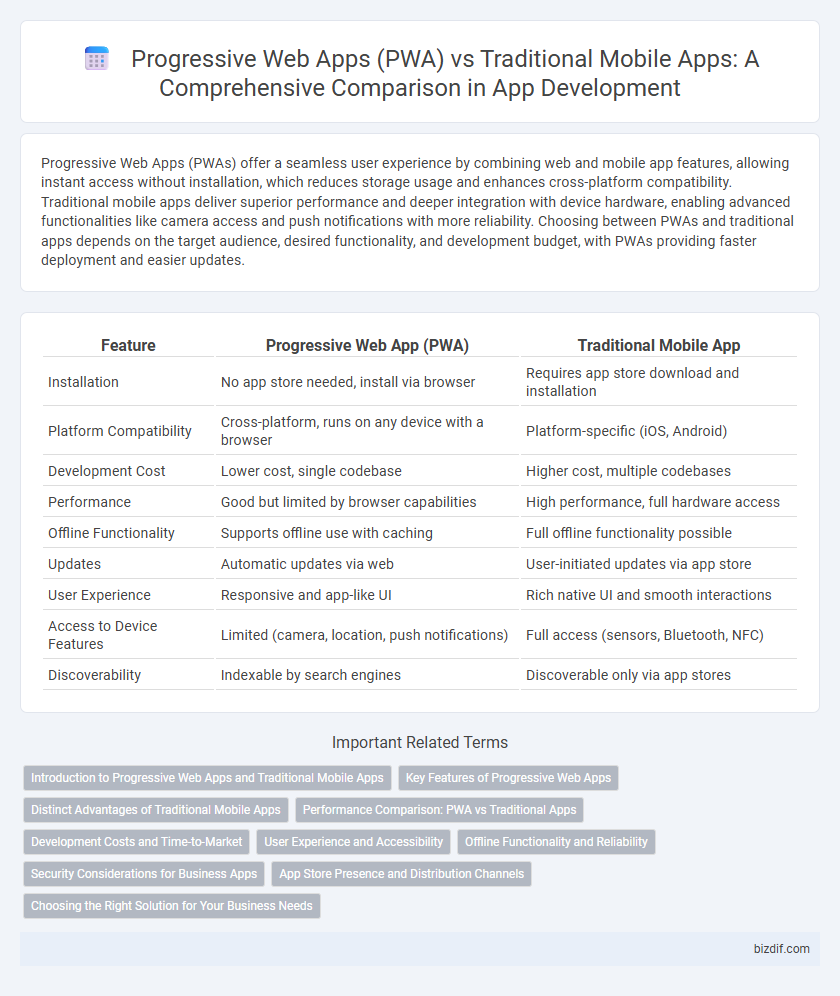Progressive Web Apps (PWAs) offer a seamless user experience by combining web and mobile app features, allowing instant access without installation, which reduces storage usage and enhances cross-platform compatibility. Traditional mobile apps deliver superior performance and deeper integration with device hardware, enabling advanced functionalities like camera access and push notifications with more reliability. Choosing between PWAs and traditional apps depends on the target audience, desired functionality, and development budget, with PWAs providing faster deployment and easier updates.
Table of Comparison
| Feature | Progressive Web App (PWA) | Traditional Mobile App |
|---|---|---|
| Installation | No app store needed, install via browser | Requires app store download and installation |
| Platform Compatibility | Cross-platform, runs on any device with a browser | Platform-specific (iOS, Android) |
| Development Cost | Lower cost, single codebase | Higher cost, multiple codebases |
| Performance | Good but limited by browser capabilities | High performance, full hardware access |
| Offline Functionality | Supports offline use with caching | Full offline functionality possible |
| Updates | Automatic updates via web | User-initiated updates via app store |
| User Experience | Responsive and app-like UI | Rich native UI and smooth interactions |
| Access to Device Features | Limited (camera, location, push notifications) | Full access (sensors, Bluetooth, NFC) |
| Discoverability | Indexable by search engines | Discoverable only via app stores |
Introduction to Progressive Web Apps and Traditional Mobile Apps
Progressive Web Apps (PWAs) combine the best features of web and mobile applications, offering offline capabilities, fast loading times, and responsive design through modern web technologies like Service Workers and Web App Manifests. Traditional mobile apps are platform-specific software installed via app stores, providing deep hardware integration and extensive access to device APIs for optimized performance. PWAs enable cross-platform compatibility without installation barriers, while traditional apps often deliver superior native functionality tailored to each operating system.
Key Features of Progressive Web Apps
Progressive Web Apps (PWAs) offer key features such as offline functionality through service workers, ensuring seamless user experience without internet connectivity. PWAs utilize responsive design to automatically adapt to various screen sizes and devices, enhancing accessibility across platforms. They also provide fast loading times and automated updates, reducing maintenance costs compared to traditional mobile apps.
Distinct Advantages of Traditional Mobile Apps
Traditional mobile apps provide superior performance and seamless integration with device hardware such as GPS, camera, and sensors, ensuring a richer user experience. These apps offer robust offline functionality and faster load times due to native code execution, which is essential for resource-intensive applications. Enhanced security measures and access to advanced operating system APIs further distinguish traditional mobile apps from Progressive Web Apps.
Performance Comparison: PWA vs Traditional Apps
Progressive Web Apps (PWAs) deliver faster load times and smoother user experiences due to service workers enabling offline access and cache management, reducing server requests significantly compared to traditional mobile apps. Traditional apps often provide more consistent performance in resource-intensive tasks by leveraging native device capabilities and optimized hardware integration, which PWAs cannot fully access through browsers. PWAs excel in cross-platform compatibility and ease of updates, while traditional apps dominate in complex functionalities and peak performance for graphics-heavy or computationally demanding applications.
Development Costs and Time-to-Market
Progressive Web Apps (PWAs) typically offer lower development costs and faster time-to-market compared to traditional mobile apps due to their single-codebase structure that works across multiple platforms. Traditional mobile app development requires building separate native applications for iOS and Android, increasing both costs and development duration. PWAs eliminate the need for app store approvals and updates, streamlining deployment and reducing ongoing maintenance expenses.
User Experience and Accessibility
Progressive Web Apps (PWAs) offer seamless user experiences through instant loading and offline functionality, enhancing accessibility across diverse devices and network conditions. Traditional mobile apps provide deeper integration with device hardware, delivering smoother performance and richer interactions for resource-intensive tasks. PWAs leverage responsive design and web standards to ensure broad accessibility without installation barriers, while traditional apps often require downloads and updates that can hinder usability for some users.
Offline Functionality and Reliability
Progressive Web Apps (PWAs) offer superior offline functionality by leveraging service workers to cache content, ensuring users can access core features without an internet connection. Traditional mobile apps rely heavily on local storage and native APIs, enabling more robust offline capabilities but requiring larger storage space and periodic updates. PWAs provide reliable performance with automatic background sync and seamless updates, reducing dependency on app store approvals.
Security Considerations for Business Apps
Progressive Web Apps (PWAs) leverage HTTPS to ensure secure data transmission, reducing risks associated with man-in-the-middle attacks, but may face limitations in accessing device-level security features compared to traditional mobile apps. Traditional mobile apps offer more comprehensive security controls, including biometric authentication and secure storage, essential for protecting sensitive business data. Choosing between PWAs and traditional apps depends on the specific security requirements and regulatory compliance standards of the business application.
App Store Presence and Distribution Channels
Progressive Web Apps (PWAs) bypass traditional app store submission processes, enabling instant access through web browsers and reducing dependency on platforms like Google Play and Apple App Store. Traditional mobile apps require approval and distribution via app stores, which exposes them to platform-specific guidelines, potential delays, and commission fees. PWAs benefit from broader reach and easier updates, while traditional apps offer better visibility in app stores and integration with native device features.
Choosing the Right Solution for Your Business Needs
Progressive Web Apps (PWAs) offer cross-platform compatibility and faster development cycles, making them ideal for businesses seeking cost-effective solutions with broad reach. Traditional mobile apps provide deeper device integration and enhanced performance, suitable for companies requiring advanced functionality and superior user experience. Choosing the right solution depends on target audience, budget constraints, and specific features critical to the business model.
Progressive Web App (PWA) vs Traditional mobile app Infographic

 bizdif.com
bizdif.com